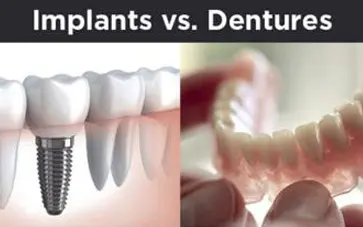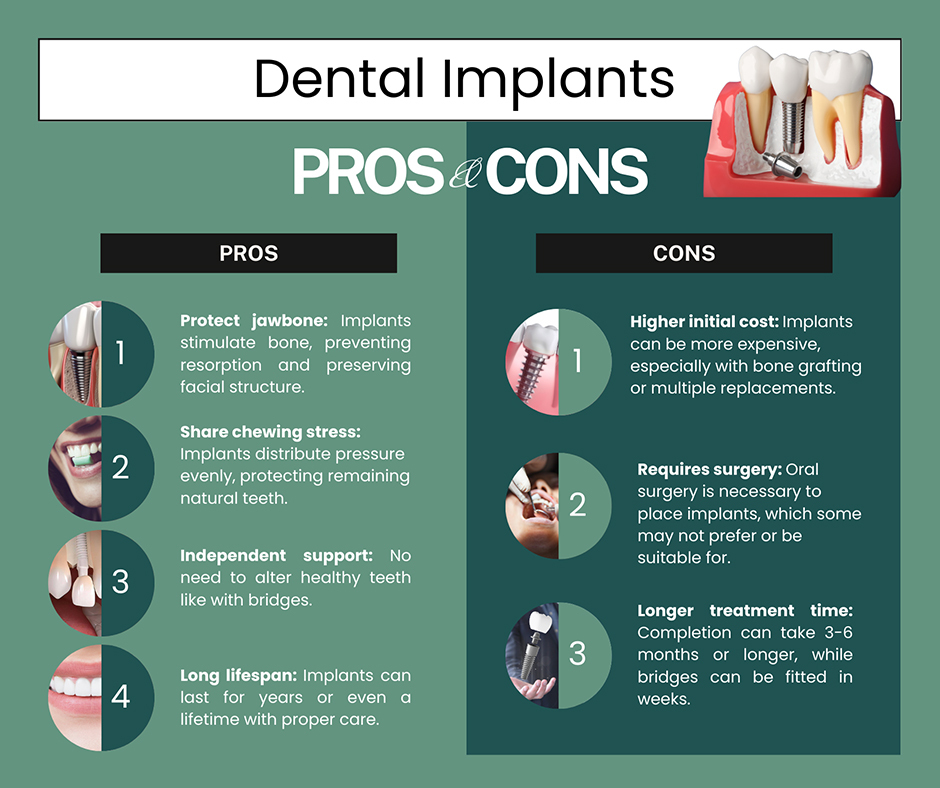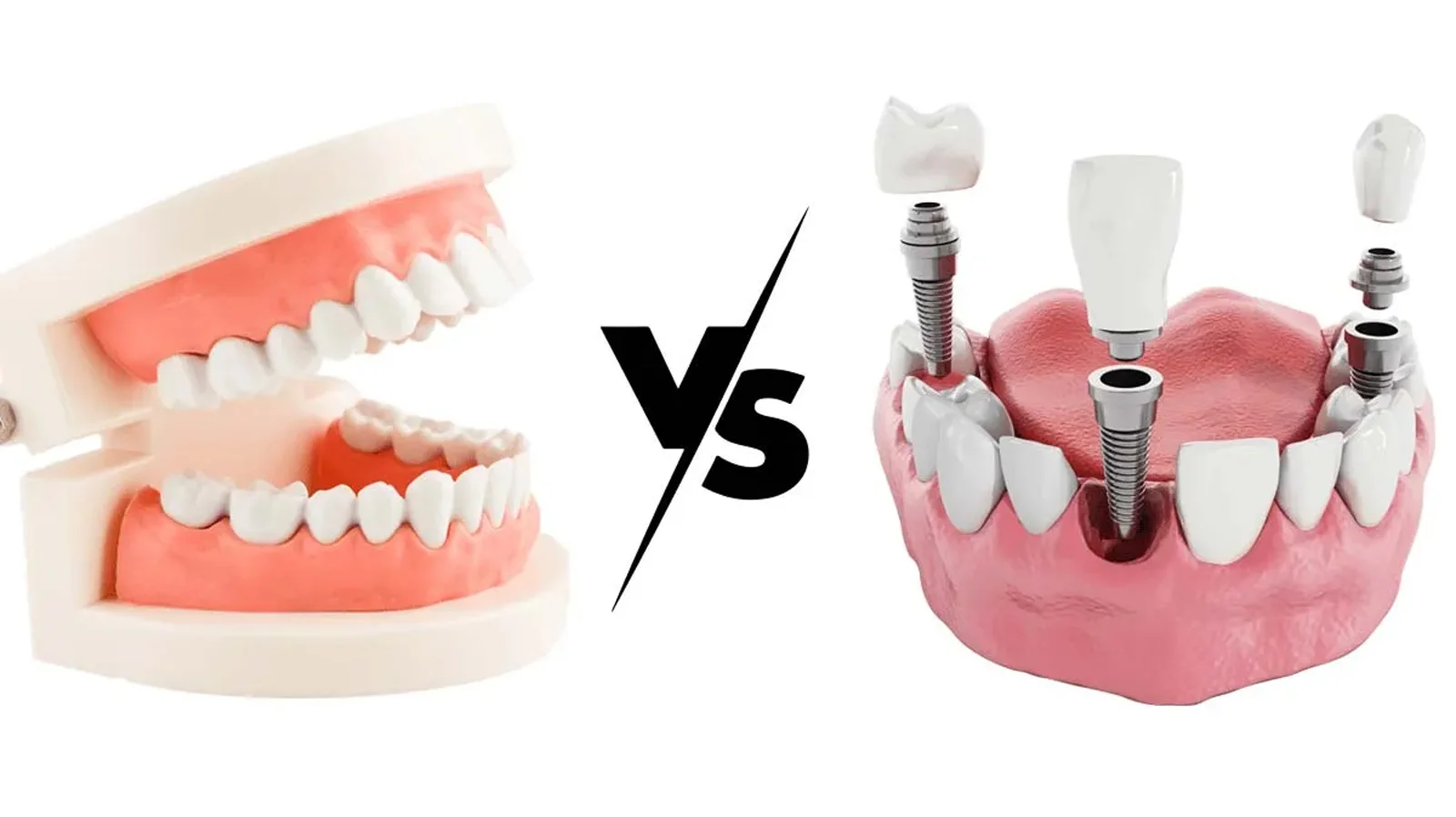When it comes to replacing missing teeth, two of the most popular options are dental implants and dentures. Both choices come with their own benefits and drawbacks. The decision often depends on your unique situation, needs, and preferences. Let’s take a closer look at both options to help you make an informed choice.

Introduction
When you decide between dental implants and dentures, you need to consider the process. First, dental implants require surgery, while dentures don’t involve any surgery. As a result, you can get dentures more quickly and with less risk. Additionally, implants provide a long-lasting solution, while dentures may need replacement after several years.
Next, think about comfort and function. While dentures shift, implants stay securely in place. This means you won’t feel discomfort from moving teeth. Moreover, implants look and feel like natural teeth. In comparison, dentures may not feel as stable, especially when eating or speaking.
Furthermore, maintaining each option differs. With dentures, you clean them daily and adjust them over time. On the other hand, implants require minimal maintenance—just regular brushing and flossing. Thus, implants offer more convenience in the long run.
Cost is another factor to consider. Although implants cost more upfront, they last longer. Conversely, dentures cost less but may need frequent replacements. So, if you’re on a budget, dentures may suit you better, but if you want a long-term solution, implants could be the right choice.
Finally, consider your bone health. If your jawbone is healthy, implants help preserve it. However, if bone loss has occurred, implants may require additional procedures. In contrast, dentures don’t offer this benefit. Therefore, implants work better for maintaining bone structure.
In conclusion, both implants and dentures offer unique advantages. Ultimately, you must choose based on your needs, budget, and lifestyle. Always consult your dentist to find the best option for you.
What Are Dental Implants?
Dental implants are permanent fixtures. They are surgically placed into your jawbone to replace missing teeth. A small titanium post is inserted into the bone, and over time, it fuses with the bone in a process called osseointegration. After healing, a crown or bridge is attached to the post, creating a natural-looking tooth.
Pros of Dental Implants:
- Permanent Solution: Implants are designed to last for many years, often for a lifetime if properly cared for.
- Natural Look and Feel: They look and function like natural teeth, making them a popular choice for those who want a discreet solution.
- Improved Speech and Comfort: Since implants are securely fixed in place, they are more comfortable than dentures, and they do not shift while speaking or eating.
- Bone Preservation: Implants help preserve jawbone health by stimulating the bone, which reduces the risk of bone loss.
Cons of Dental Implants:
- Cost: Implants are generally more expensive than dentures, especially when multiple teeth are involved.
- Surgical Procedure: The placement of implants requires surgery and a recovery period, which can take several months.
- Not Suitable for Everyone: In some cases, patients may not have enough jawbone density to support implants, requiring additional procedures like bone grafting.

What Are Dentures?
Dentures are removable prosthetic teeth. They are typically made of acrylic, porcelain, or a combination of both. Dentures are designed to rest on your gums and can replace either a full set or just a few missing teeth. You can remove and clean them easily.
Pros of Dentures:
- Lower Cost: Dentures are typically less expensive than implants, making them an attractive option for people on a budget.
- Quick Solution: Getting dentures is a faster process compared to implants. In many cases, dentures can be ready in just a few weeks.
- Non-Invasive: Unlike implants, dentures don’t require surgery. This can be appealing to individuals who are wary of invasive procedures.
Cons of Dentures:
- Less Stability: Dentures can shift or slip, especially when eating or talking, which may be uncomfortable or embarrassing for some people.
- Maintenance: Dentures require regular cleaning and maintenance. They can also wear down over time, requiring adjustments or replacements.
- Bone Loss: Unlike implants, dentures do not stimulate the jawbone, which can lead to bone loss over time and affect facial structure.
Which Option is Best for You?
Your choice between dental implants and dentures depends on several factors. Let’s break them down.
1. Budget Considerations
If cost is a significant concern, dentures may be the more affordable option. They are generally less expensive upfront. However, implants, though more costly initially, can be a better long-term investment due to their durability and longevity.
2. Lifestyle and Comfort
Dental implants provide a more stable and natural solution. If you want teeth that feel and function like your own, implants are likely the best choice. They require less maintenance and do not shift. On the other hand, if you prefer an easy-to-remove option and don’t mind occasional adjustments, dentures could be a good fit for you.
3. Bone Health and Jaw Integrity
If you have lost a significant amount of bone in your jaw, implants might not be an option unless you undergo bone grafting. In this case, dentures could be a more viable solution, though they won’t prevent further bone loss. Conversely, if your jawbone is healthy enough to support implants, this option could help maintain your bone structure in the long run.
4. Time and Convenience
Dental implants require a longer treatment process due to the surgical placement and healing time. Dentures, however, can be created and fitted more quickly. If you’re looking for a fast solution, dentures might be the way to go. But if you’re willing to wait for a long-lasting result, dental implants offer a more permanent solution.

Conclusion: Making the Right Choice
Both dental implants and dentures have their own unique advantages and disadvantages. It’s essential to consider your budget, lifestyle, bone health, and how much time you’re willing to invest in the process. Consult with your dentist to determine which option is best for you.
Ultimately, the decision is yours. If you prioritize stability and a natural look, dental implants are the better choice. However, if you’re seeking a less invasive and more affordable solution, dentures could be the right fit. Whichever path you choose, both options can significantly improve your quality of life by restoring your smile and dental function.

